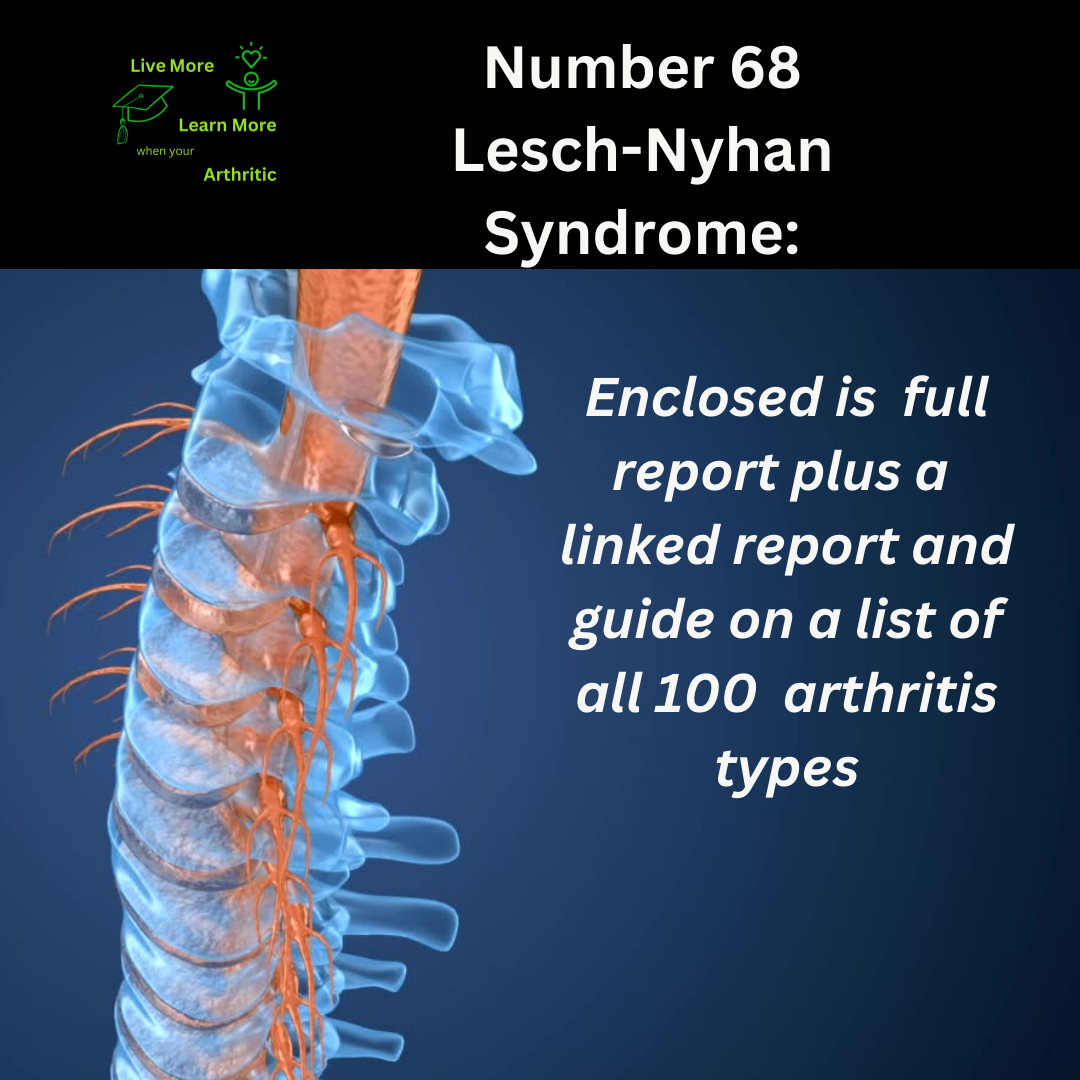
Lesch-Nyhan Syndrome: Number 68 on the list of 100 types of Arthritis
Lesch-Nyhan Syndrome (LNS) is a rare genetic disorder that presents unique challenges for individuals and families affected by it. Understanding this condition and its management is crucial for optimizing quality of life and providing appropriate support.
 Description of Lesch-Nyhan Syndrome
Description of Lesch-Nyhan Syndrome
Lesch-Nyhan Syndrome is a genetic disorder caused by mutations in the HPRT1 gene, leading to deficiency in the enzyme hypoxanthine-guanine phosphoribosyltransferase (HGPRT). This enzyme deficiency results in the buildup of uric acid in the body, leading to a range of neurological and behavioral symptoms.
Causes and Triggers
Lesch-Nyhan Syndrome is caused by mutations in the HPRT1 gene, which is responsible for producing the HGPRT enzyme. These mutations are inherited in an X-linked recessive manner, meaning the gene is located on the X chromosome. The condition predominantly affects males, as they have only one X chromosome.
Symptoms
Lesch-Nyhan Syndrome is characterized by a triad of symptoms:
- Neurological symptoms: Individuals may experience involuntary movements (dystonia), spasticity, and impaired voluntary muscle control.
- Behavioral abnormalities: Aggressive and self-injurious behaviors, such as biting of fingers or lips, are common.
- Uric acid accumulation: High levels of uric acid in the body can lead to kidney stones, gout, and other metabolic complications.
Common Ages of Onset
Lesch-Nyhan Syndrome typically manifests in infancy or early childhood, often becoming apparent around 6-12 months of age when neurological and behavioral symptoms emerge.
Impact on Lifespan
Lesch-Nyhan Syndrome significantly affects lifespan and quality of life. The condition is associated with severe neurological and behavioral impairments, and affected individuals often have a shortened lifespan due to complications such as kidney failure or respiratory issues.
Achieving a Higher Quality of Life
While Lesch-Nyhan Syndrome poses significant challenges, a proactive approach can help improve quality of life:
- Behavioral therapies: Implementing behavioral interventions and strategies to manage aggressive behaviors and self-injury.
- Supportive care: Providing comprehensive care by a multidisciplinary team, including neurologists, psychologists, and physical therapists, to address symptoms and optimize function.
- Assistive devices: Utilizing assistive devices such as wheelchairs or braces to support mobility and independence.
Possible Complications
Complications of Lesch-Nyhan Syndrome may include:
- Severe neurological impairments: Progressive dystonia and spasticity can lead to severe mobility limitations.
- Behavioral challenges: Self-injurious behaviors pose significant risks and require ongoing management and support.
- Metabolic complications: High levels of uric acid can result in kidney stones, gout, and renal failure.
 Natural Breakthroughs or Health Advantages
Natural Breakthroughs or Health Advantages
There are no specific natural breakthroughs associated with Lesch-Nyhan Syndrome. However, maintaining a well-balanced diet, staying hydrated, and managing metabolic complications can help mitigate some of the associated health risks.
Gender and Age Prevalence
Lesch-Nyhan Syndrome primarily affects males, as the condition is linked to mutations on the X chromosome. Females can be carriers of the gene mutation but typically do not exhibit symptoms.
Interconnected Diseases or Conditions
Lesch-Nyhan Syndrome is a complex genetic disorder with profound neurological and behavioral manifestations. While there are no specific interconnected diseases, individuals with LNS require specialized care and ongoing support from healthcare professionals.
In conclusion, Lesch-Nyhan Syndrome is a rare and debilitating genetic disorder with significant neurological and behavioral implications. While proactive management strategies can improve quality of life and provide support, the condition presents profound challenges for affected individuals and families. Collaboration with a multidisciplinary team of healthcare professionals is essential for personalized care and optimizing outcomes.